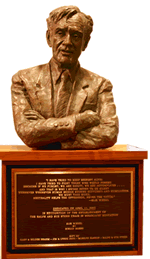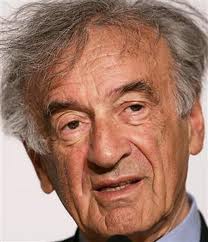Posted on October 29, 2010 at 3:07 pm
Wiesel to begin fellowship at Chapman University; retain position at BU
by Carolyn Yeager
Elie Wiesel will “spend time” at Chapman University in Orange, California beginning this spring and for the following four years, through 2015, according to Chapman President Jim Doti. Wiesel has been appointed as a “Distinguished Presidential Fellow”, which means he will visit classes in Chapman’s Holocaust history minor, and possibly other disciplines, including history, French, religious studies and literature, according to chapmannews.
Chapmannews reports that complete plans for his fellowship activities are still in progress (as of August) and that he will retain his full-time faculty position at Boston University. As we have pointed out on this website, Wiesel’s duties at BU are light, leaving him time for his extra-curricular activities, now including being employed by a second university. However, Wiesel’s fellowship stay is also described as amounting to only “several days each spring.” My! “Visit” is certainly the right word for it.
“Distinguished Presidential Fellow” may be a newly invented position, meaning that he is appointed by the President (Jim Doti), not hired under academic requirements by a department dean. Wiesel will be what you might call, in diplomatic terms, an at-large representative of the Jewish interests that are no doubt paying his salary. He will be most closely associated with Chapman’s Rodgers Center for Holocaust Education, a unique construction that bridges the Religion and History Depts, and was opened in Feb. 2000 “through a generous gift from Barry and Phyllis Rodgers, [and] dedicated to preparing young people to become witnesses to the future.” Witnesses of the Holocaust? Is this the job of a university? Well, it seems to depend on who offers the money, and what they want it to be used for.
Wiesel offered special words of praise to Dr. Marilyn Harran, who directs the Rodgers Center for Holocaust Education, for “the way in which the university is teaching and remembering some of the most tragic events in human history, events that have had such a deep influence upon my life.” She and the Center are the reason that Wiesel says he “made the decision to return to Chapman annually as Distinguished Presidential Fellow.”
Dr. Harran is a professor of both history and religious studies at Chapman. She has even stronger words of praise for Wiesel, announcing, “[he] has been the face and voice of Holocaust memory and witness to the world, and an ambassador of humanity and hope for decades. He has consistently challenged us to learn from the Holocaust and to reject indifference, and – in his words – ‘to think higher and feel deeper.’ We are unbelievably fortunate that he has chosen to return to Chapman and to share with us his knowledge and wisdom. I am stunned and deeply grateful that he will be with us in this new role as Distinguished Presidential Fellow. I know our university community will be profoundly enriched and inspired by his presence.”
University President Doti is equally humbled by the presence of the great man, saying “That this remarkable individual, one of the world’s most famous and respected people, one who truly exemplifies the meaning of ‘global citizen,’ should choose to return to spend time with our students is truly a tremendous honor for Chapman.”
Does it seem from this that Wiesel will be under any kind of performance requirement at Chapman, or will he be the determiner of his own course of action? It is probably the same at Boston University – the tail is wagging the dog. But Wiesel’s presence at both universities is more a public relations benefit to the school than an educational benefit for students. His fame as a Holocaust icon, including his Nobel Peace Prize, make him a valuable commodity – as opposed to having any pretensions to scholastic stardom.
Chapman University is seeking to transition from a “teaching university” to a “research university.” That means the faculty will be required to “publish” in the field of their expertise, and the more you publish, the higher your pay. Not all faculty think this will be beneficial to the student experience at Chapman; there is a school of thought that values professors as mainly teachers rather than researchers. But others, probably more powerful, think it’s more important to “upgrade” Chapman into a higher-rated university.
Emphasis on the Holocaust
Elie Wiesel’s visiting fellowship may be in accord with those objectives. The Sala and Aron Samueli Holocaust Memorial Library opened in April 2005, dedicated to providing a space “where teachers and students may gather to learn from survivors, visual testimonies and printed resources.” At the entrance to this library is a large bronze bust of – guess who? Elie Wiesel!  The library has an exhibit area that currently displays “Themes of the Holocaust” featuring photos and artifacts donated or lent by individuals and institutions. Group tours are also arranged. It’s like a little Holocaust museum right there on the university grounds.
The library has an exhibit area that currently displays “Themes of the Holocaust” featuring photos and artifacts donated or lent by individuals and institutions. Group tours are also arranged. It’s like a little Holocaust museum right there on the university grounds.
At Chapman, the Holocaust is taught in both the Religion and History Depts., and several of the courses overlap both. It is really quite amazing how much of the History curriculum is devoted to this subject. That Holocaust is taught in the Religion Department—as it is at Boston University—makes sense because it is a belief. It has become an unquestioned, highly enforced belief system that is assumed to be true at its base, but with too little examination of the basic operations it would require.
A difference in approach at Chapman however, as compared to BU, is the emphasis on Holocaust in the History Dept. I discovered six courses containing Holocaust, five of them devoted exclusively to it. This is a lot for a small university like Chapman, perhaps more than at any other accredited university in the United States. The History Dept. offers on an every-year basis:
HIST 307 Germany and the Holocaust
(Same as REL 307.) This course examines the Holocaust within the context of the history of World War II. Topics include the origins of the Holocaust, the implementation of the Final Solution, resistance to the Nazis, survivor experiences, and the legacy of the Holocaust. (Offered every year.) 3 credits. Also offered in Religion
HIST 365 Topics in the Holocaust
(Same as REL 365.) This course examines selected topics within the study of Holocaust history, such as the roles of doctors, theologians and religion under Hitler, the persecution of non–Jewish groups (including homosexuals and gypsies), and the experiences and choices of perpetrators, victims, and bystanders. Courses that treat different themes may be repeated for credit. (Offered every year.) 3 credits. Also offered in Religion
HIST 365a Perpetrators, Witnesses, and Rescuers
[Same as REL365a] Within the context of Nazi Germany, World War II and the Holocaust, this course examines the choices that individuals faced and the decisions that defined them as perpetrators or rescuers. Includes the stories of those who survived the Holocaust to become witnesses to the truth. (Offered every year.) 3 credits. Also offered in Religion
Offered every other year, Spring semester:
HIST 365b The Holocaust: Memoirs and Histories
This course explores the complex history of the Holocaust from the perspective of selected memoirs written by survivors and examines the contributions and limitations of memoirs in shaping the historical record. (Offered spring semester, alternate years.) 3 credits.
The following two courses are offered “as needed:”
HIST 356 Modern Germany: From Sarajevo to Stalingrad
This course examines the political, social, and intellectual history of Germany from World War I to the end of World War II. Topics include the Holocaust and the roles of individuals in taking Germany down the path to two world wars. (Offered as needed.) 3 credits.
HIST 297 The Holocaust in History and Film
An introduction to the history of the Holocaust, from initial persecution to the implementation of the Final Solution, including the actions of perpetrators, rescuers, and resisters; the dilemmas facing those targeted for persecution, and major issues in the interpretation and visual representation of the Holocaust. (Offered as needed) 3 credits.
* * *
The Religion Dept. at Chapman offers three courses every year that are also offered in History:
REL 365 Topics in the Holocaust
(Same as HIST 365.)
REL 365a Perpetrators, Witnesses, and Rescuers
(Same as HIST 365A.)
REL 307 Germany and the Holocaust
(Same as HIST 307.)
In addition to all of this, there is the extensive program offerings of the Rodgers Center for Holocaust Education, which is entirely funded by several Jewish groups outside the university. According to the Chapman website, the mission of the Rodgers Center is to increase knowledge of the Holocaust, further discussion of the causes of genocide, and encourage reflection on the contemporary relevance of the Holocaust to our lives today.
As part of its mission, the Center sponsors a Lecture Series each year. For example, on Sept. 21 James Young gave a lecture entitled “Stages of Memory: Challenges of Memorialization (sic) from the Holocaust to the World Trade Center.” Young is Professor of English and Judaic Studies at the U of Mass, Amherst. He has written two books about the Holocaust: one about Holocaust Memorials and one about Holocaust Architecture. [Isn’t Holocaust to the World Trade Center quite a stretch? -cy]
The Art and Writing Contest is an annual program that involves “thousands of Southern California middle and high school teachers and students, culminating in an awards ceremony on campus.
Beginning in 2000, the Rodgers Center began a yearly Evening of Holocaust Commemoration to create a “community of witnesses” for the Chapman area.
What more can they think up?!
No one can deny that Holocaust is alive and well at Chapman University. And now Elie Wiesel, the “Grand Poobah” himself, will arrive every spring to energize it even further, and bring lots of media attention in his wake. This is a public relations dream!
But for those of us who care about the truth, it’s more like a nightmare. What do you think, dear reader?
Categories Featured | Tags: Chapman University, Distinguished Presidential Fellow, Marilyn Harran, Rodgers Center for Holocaust Education, Sala and Aron Samueli Holocaust Memorial Library
Leave a Reply
By submitting a comment here you grant Elie Wiesel Cons the World a perpetual license to reproduce your words and name/web site in attribution. Inappropriate or irrelevant comments will be removed at an admin's discretion.



4 Comments to Wiesel to begin fellowship at Chapman University; retain position at BU
by D. Greene
On February 26, 2018 at 4:54 pm
Given the number of people I’ve met who were there at Krystallnacht through the liberation of the camps, it’s clear the effort you’ve put into this website for the last 8 years has been an irrelevant waste of time. The information here may prove interesting to your fellow Nazis, but to the average reasonable person there is nothing of value here whatsoever.
by Carolyn
On March 14, 2018 at 2:25 pm
D. Greene – Then why are you wasting your time to read, write and send this comment? You probably know this website reaches a lot of people, consistently, for 8 years. And I’m not shutting it down, sorry.
I bet you don’t even know where the so-called Krystallnacht supposedly took place. I bet you couldn’t say one intelligent thing about it.
Trackbacks